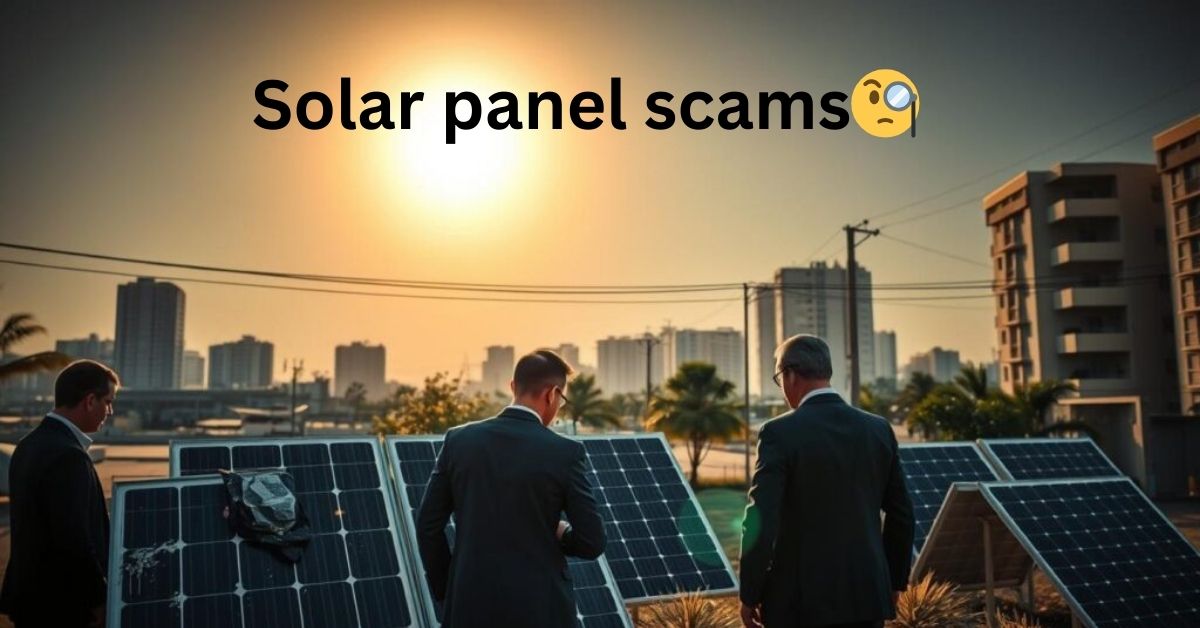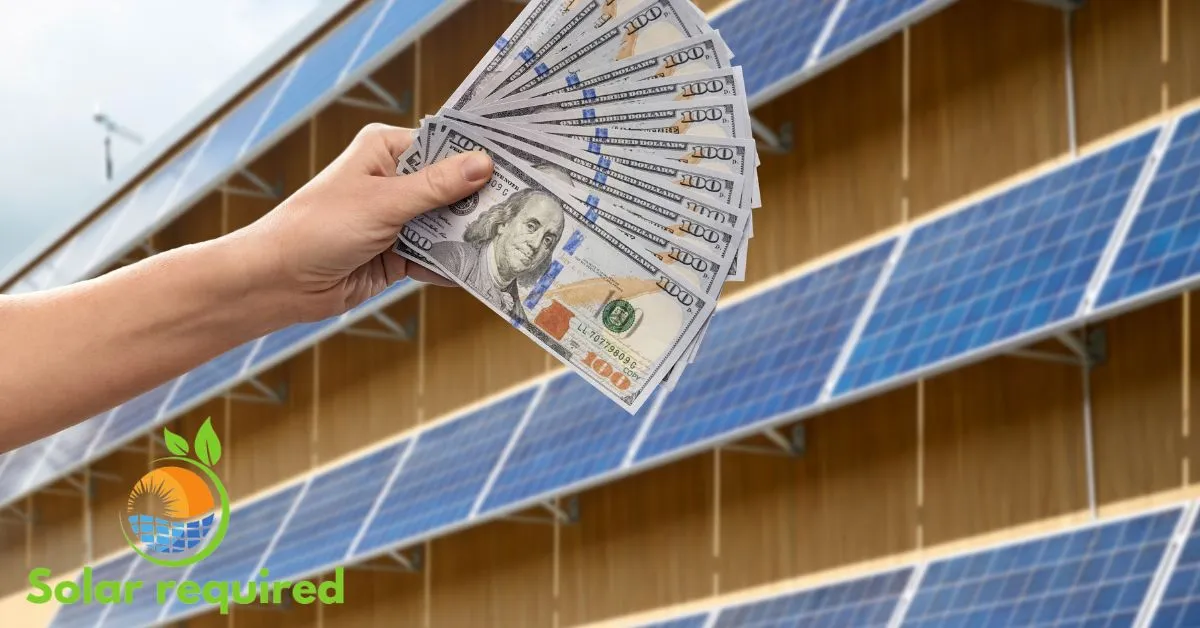The rise in solar energy solutions has also brought out scams targeting consumers. This article aims to expose these scams and teach you how to dodge them. It’s important to stay alert in the solar market to avoid financial losses and keep trust in green energy.
We’ll look at the types of scams and how to protect your solar power investments. This will help you make smart choices and avoid scams.
Key Takeaways
- Understanding the different types of solar panel scams is essential for protection.
- Always research and verify solar installation offers before committing.
- Know the red flags associated with misleading solar contracts.
- Develop awareness of your rights as a consumer in the solar market.
- Utilize credible resources to find trustworthy solar companies.
- Report any signs of fraud to relevant authorities for consumer protection.
Introduction to Solar Panel Scams
More people are turning to solar power to save on energy costs. This has led to scams in the solar industry. It’s important to know about these scams to avoid getting caught.
Scammers target those wanting to use solar energy. They use fake promises and high prices to trick people. Knowing the signs of scams helps you make smart choices.
Staying informed is key to fighting solar scams. By knowing the common scams, you can ask the right questions. This way, you can protect your money and make a good choice.
Understanding Solar Panel Scams
Solar panel scams are a big problem in the renewable energy world. They trick people who want to use solar power. These scams promise a lot but usually don’t deliver anything.
The scammers use tempting offers that seem too good to be true. This is how they get people to sign up for things they don’t need.
What Are Solar Panel Scams?
Solar panel scams include many types of fraud. One common scam is fake offers to install solar systems. These offers often have hidden costs.
Some scams promise big savings or bonuses that never happen. This leaves people feeling upset and out of pocket, as they’ve paid for nothing.
Why Are They So Prevalent in Today’s Market?
There are a few reasons why solar panel scams are so common. The growing interest in solar energy draws in people who want to make money. But, there’s not enough oversight to stop bad companies.
This means many scams target people who want to use clean energy. It’s a big problem that needs to be solved.
3 Common Types of Solar Panel Scams
The solar energy market has many benefits but also attracts scams. Knowing the common scams helps people make smart choices. Here are three scams often found in the solar industry.
Fake Solar Installation Offers
Many people get offers from fake solar panel installers with very low prices. These scams promise free installations with government rebates or tax credits. But, these low prices are often too good to be true.
It’s important to check the credentials of these installers. This way, you can avoid falling into solar energy scams.
Misleading Solar Contracts
Another common problem is misleading solar contracts. These contracts have complex terms or hidden fees. They use confusing language to trick clients.
It’s crucial to carefully read and question these contracts. This can help you avoid scams in the solar industry. Being careful can save you time and money.
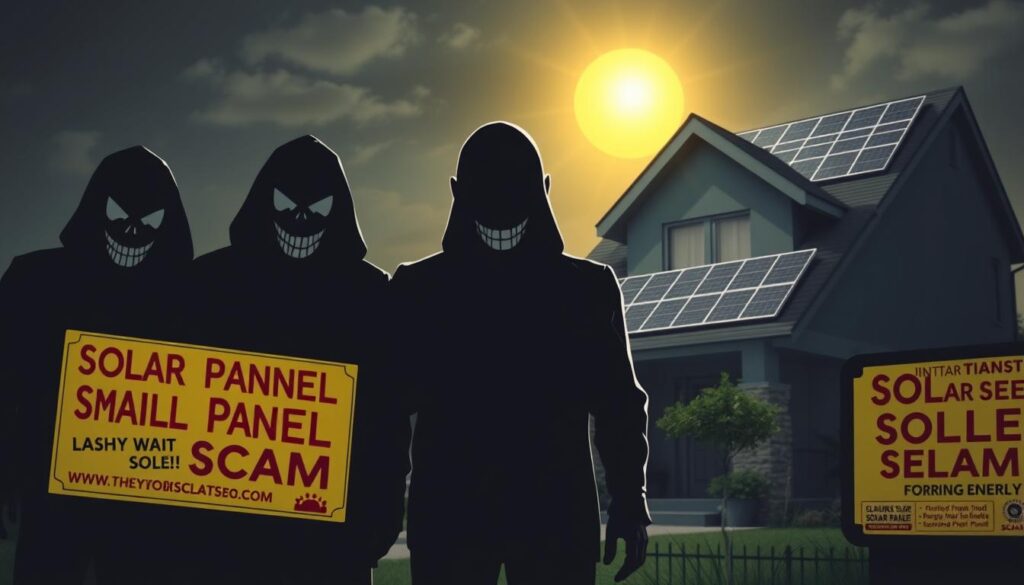
Recognizing the Signs of a Solar Panel Scam
It’s important to know how to spot a solar panel scam. Being aware of common warning signs helps you make smart choices. Watch out for sales tactics and how salespeople act to avoid scams.
Common Red Flags to Look Out For
- Pressure Tactics: Be careful if someone pushes you to buy right away, making it seem urgent.
- Lack of Transparency: A real company will clearly explain the product, cost, and how it’s installed.
- Unrealistic Promises: Be wary of promises that seem too good to be true, like huge energy savings without details.
- Overly Aggressive Sales Strategies: Scammers use strong sales tactics to stop you from looking around.
How to Spot Deceptive Practices in Solar Sales
Knowing how to identify solar scams is key. Do your homework. Check the company’s credentials and read reviews from others. Look for endorsements from outside groups to back up their claims.
By staying alert and informed, you can avoid falling into a solar panel scam. Protect yourself from fraud.
How to Avoid Solar Panel Scams
To avoid solar panel scams, start by checking the licenses and certifications of potential installers. This ensures they follow local laws and industry standards. It gives you confidence in their work. Here are some proven tips for selling solar panels.
Another good step is to ask for references from past clients. A trustworthy installer will have happy customers ready to share their stories. Online reviews can also help you see if the company is reliable and provides good service.
Getting quotes from several installers is a smart move. It lets you compare prices, services, and warranties. Watch out for unsolicited offers, as they might be signs of high-pressure sales tactics.

Lastly, do your homework. Knowing the market and typical prices helps you make smart choices. This way, you can avoid scams more easily.
| Tip | Description |
|---|---|
| Verify Licenses | Check if the installer is licensed and insured to operate in your area. |
| Ask for References | Contact past clients to learn about their experiences with the installer. |
| Read Reviews | Look for online testimonials to gauge the company’s reputation. |
| Get Multiple Quotes | Collect and compare quotes from different companies for the best deal. |
| Research Thoroughly | Educate yourself on solar technology and the current market trends. |
Researching Reputable Solar Companies
Choosing the right solar company is key for a good installation and lasting satisfaction. Looking into reputable solar panel companies helps avoid bad services. A company with a good reputation can save you time and money, making your solar experience positive.
Why Reputation Matters
In the solar industry, reputation is very important. A company known for quality and good service usually does better. Here are some things to look at when checking a company’s reputation:
- Positive customer reviews and testimonials
- A strong presence in the community
- Accreditations and certifications
- Transparent pricing and contract terms
Resources for Finding Trustworthy Installers
There are many ways to find reliable solar companies. Using these resources helps you make smart choices and protects you as a solar energy buyer. Here are some good resources:
- Online Directories: Sites like EnergySage or SolarReviews list solar companies and their ratings based on customer feedback.
- Customer Review Platforms: Yelp and Google Reviews let you see what others have to say about a company.
- Industry Organizations: The Solar Energy Industries Association (SEIA) has certified professionals and useful articles.
- Word of Mouth: Hearing from friends, family, or neighbors can give you valuable info about local solar companies.

| Resource Type | Description | Benefits |
|---|---|---|
| Online Directories | Comprehensive lists of solar companies with ratings. | Easy comparison and access to customer feedback. |
| Review Platforms | Customer-driven insights available on various platforms. | Real experiences help gauge service quality. |
| Industry Organizations | Accredited installers and reliable industry information. | Ensures credibility and trustworthiness. |
| Word of Mouth | Personal recommendations from those using solar. | Trustworthy insight from known individuals. |
Consumer Protection Measures Against Solar Fraud
Solar energy is getting more popular, and so is the need to protect against scams. Many resources are out there to help people avoid solar fraud. The Federal Trade Commission (FTC) and state consumer protection offices offer tools and advice.
It’s important to know about warranties and financing from solar installers. This knowledge can help prevent scams. Each state has laws for solar contracts to keep things fair. These laws help protect people from false promises.
Using these resources helps prevent fraud. If something seems off, report it and ask for help from state agencies. This helps keep the market fair and lets people make smart choices.
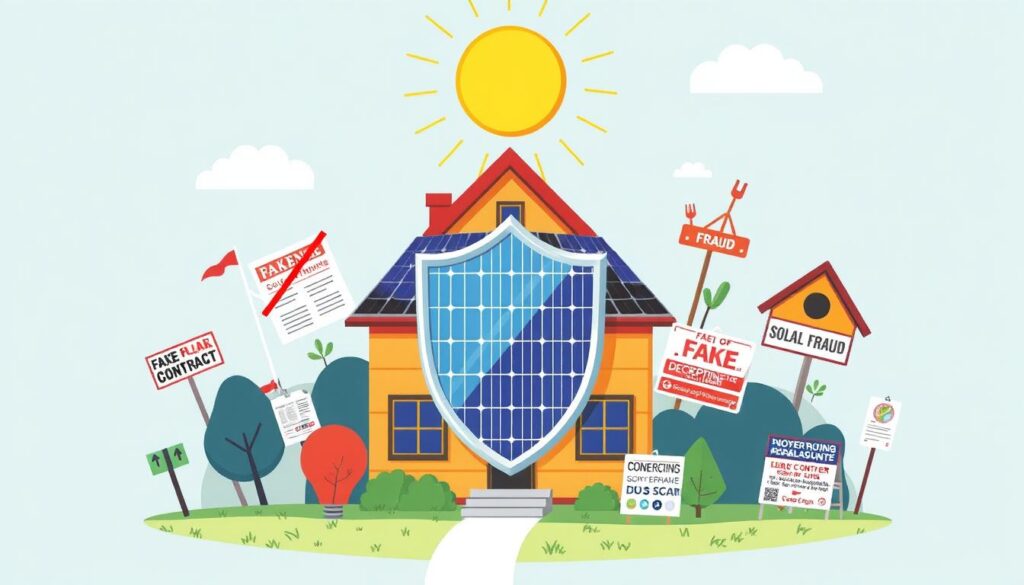
| Resource | Type of Assistance | Contact Information |
|---|---|---|
| Federal Trade Commission (FTC) | Guidance on scams, complaint filing | www.ftc.gov |
| State Consumer Protection Office | Local regulations, consumer rights | Contact your state office |
| BBB (Better Business Bureau) | Company ratings, complaints | www.bbb.org |
| Energy Commission | Installer compliance verification | Contact your state energy office |
Solar Panel Scams: How to File a Report
Running into a solar panel scam can be scary and upsetting. It’s important to report these scams to protect yourself and others. Here’s how to document and report any fraud related to solar panels.
Steps to Document and Report Scams
When you think you’ve been scammed, it’s key to document everything. Follow these steps to report solar fraud effectively:
- Collect Evidence: Take photos of any misleading ads, contracts, or installations. Save any emails and physical documents from the deal.
- Write a Summary: Clearly write down what happened, including dates, names, and scam details.
- Preserve Records: Keep all related documents. This helps when filing a complaint and provides strong evidence.
- Reach Out to Authorities: Contact local police and file a report. They might investigate further.
Where to Report Signs of Fraud
It’s important to know where to report solar scams. Several agencies help protect consumers:
- Federal Trade Commission (FTC): File complaints online or call their help line.
- State Attorney General’s Office: Many states have consumer protection divisions for fraud reports.
- Better Business Bureau (BBB): File a complaint on their site to warn others and track scammers.
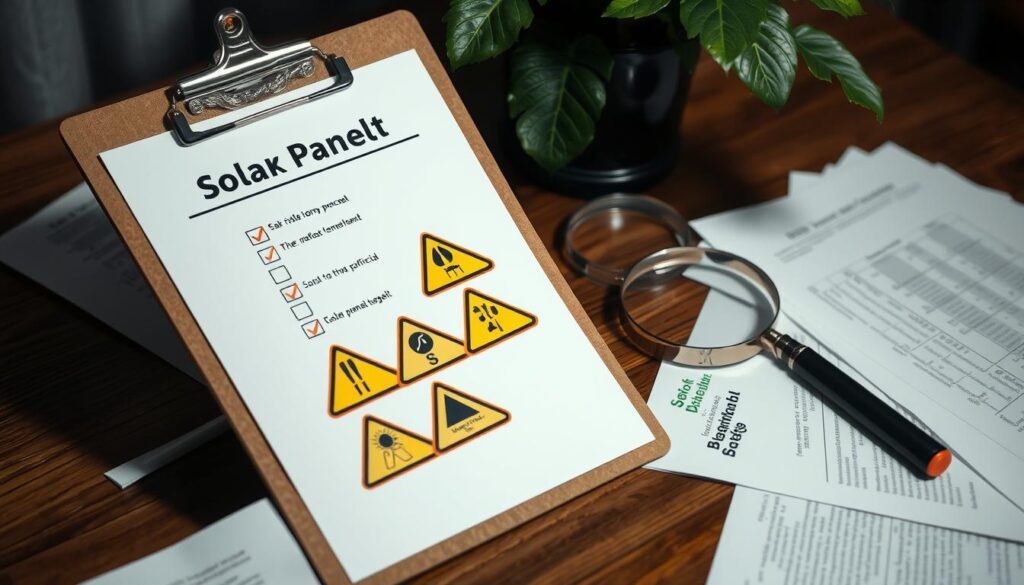
By following these steps and knowing where to report solar fraud, you help fight scams. You also protect other consumers from harm.
Tips for Identifying Solar Panel Scams
In today’s market, knowing about solar technology is key. This knowledge helps you spot scams in the solar panel world. Learning about common terms and your consumer rights makes you more confident when choosing solar companies.
Educating Yourself About Solar Technology
Learning about solar panels, their efficiency, and installation is important. This knowledge helps you avoid false claims. Here are some key areas to learn:
- Types of solar panels and their differences
- Typical costs and financing options
- Installation timelines and maintenance requirements
Knowing these details helps you ask better questions and evaluate offers wisely.
Understanding Your Rights as a Consumer
Knowing your consumer rights is vital for avoiding scams. Learn about:
- Your right to clear pricing and contracts
- Warranties and what they cover
- Local and federal solar installation rules
With this knowledge, you can spot offers that don’t meet legal standards. This leads to safer choices.
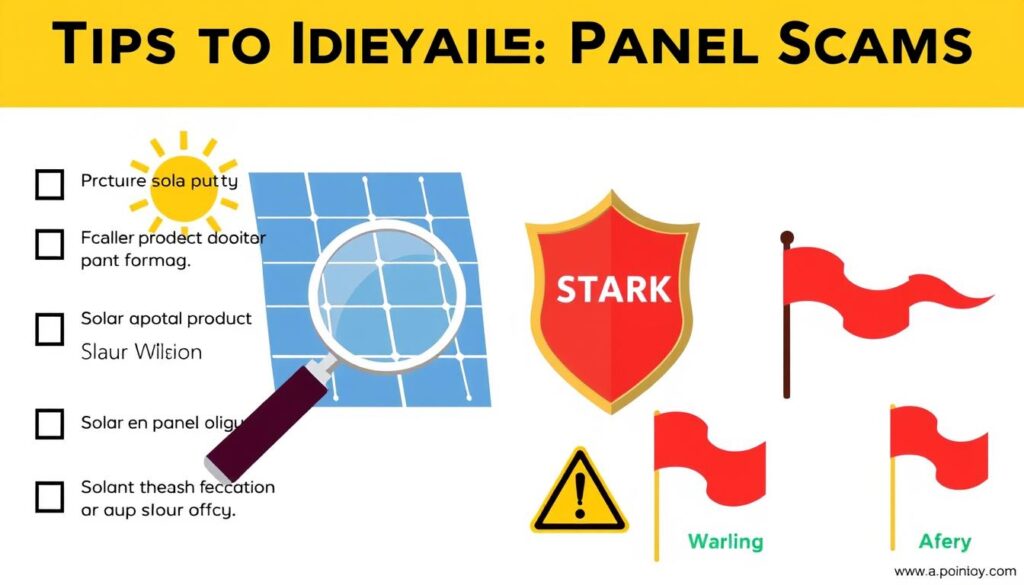
Preventing Solar Panel Scams in Your Community
Communities are key in stopping solar panel scams. By teaching locals, we can make it tough for scammers. Hosting workshops with solar experts is a great way to start. These sessions teach people how to spot scams.
Sharing tips in community newsletters and on social media also helps. It keeps everyone informed about scams and how to avoid them. When neighbors share their stories, it builds trust and openness.
Starting community groups focused on scams is another good idea. These groups help people report suspicious activities. They also meet regularly to talk about new scam trends.
Working together to fight scams can really make a difference. By sharing knowledge and resources, we can protect our communities from fraud.
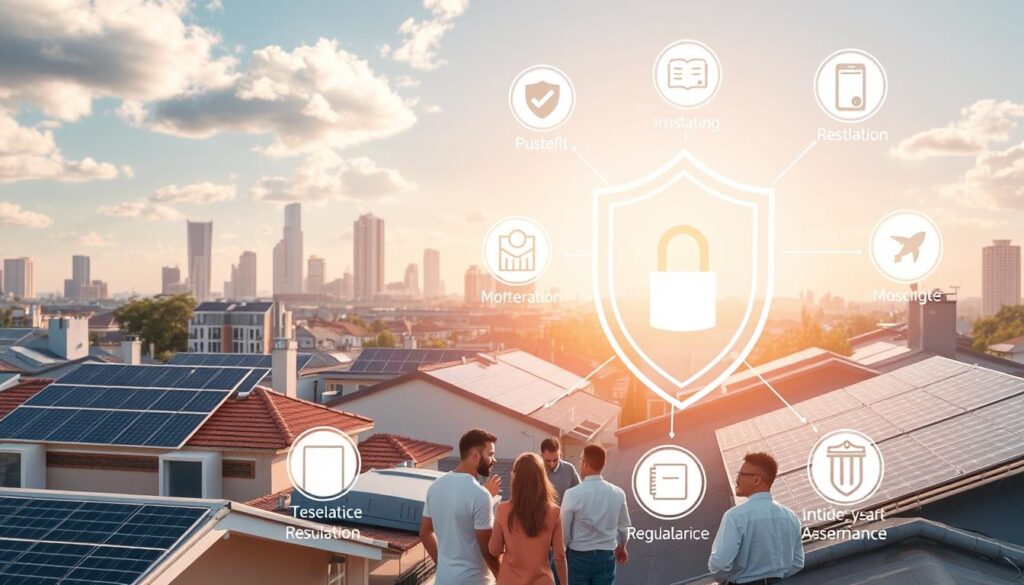
| Strategy | Description |
|---|---|
| Workshops | Invite experts to educate residents on solar technology and scams. |
| Informational Campaigns | Disseminate information through newsletters and social media to raise awareness. |
| Community Watch Groups | Form groups to support residents and report suspicious activities. |
The Role of Regulatory Bodies in Solar Protection
As more people turn to solar energy, scams targeting them grow too. Regulatory bodies are key in fighting these scams. They enforce laws to keep the solar industry honest.
How State and Federal Agencies Help
State and federal agencies work together to keep solar companies in line. They do many important things, like:
- Making sure solar companies have licenses and bonds to be accountable.
- Checking solar installations to make sure they meet safety and quality standards.
- Taking action against companies that scam people.
- Teaching consumers about their rights and how to spot scams.
- Helping consumers report fraud and get help.
These agencies are a strong defense against solar scams. They help consumers make smart choices and avoid scams. A transparent solar market builds trust and helps honest companies grow.
| Regulatory Agency | Key Functions | Consumer Resources |
|---|---|---|
| Federal Trade Commission (FTC) | Enforces laws against deceptive advertising practices | FTC Complaint Assistant |
| State Public Utility Commissions | Regulates rates and services of energy providers | State-specific consumer awareness programs |
| Consumer Financial Protection Bureau (CFPB) | Ensures fair and transparent financial products | CFPB Resources for Consumers |

Solar Panel Scam Investigations
When people suspect solar scams, a detailed process starts. Regulatory groups and law enforcement dive into these claims. They look at financial records, ads, and what customers say.
They also talk to those who have complaints. This helps them find patterns in the scams. It helps them figure out if the claims are true. People who think they’ve been scammed should share their stories and any proof they have.
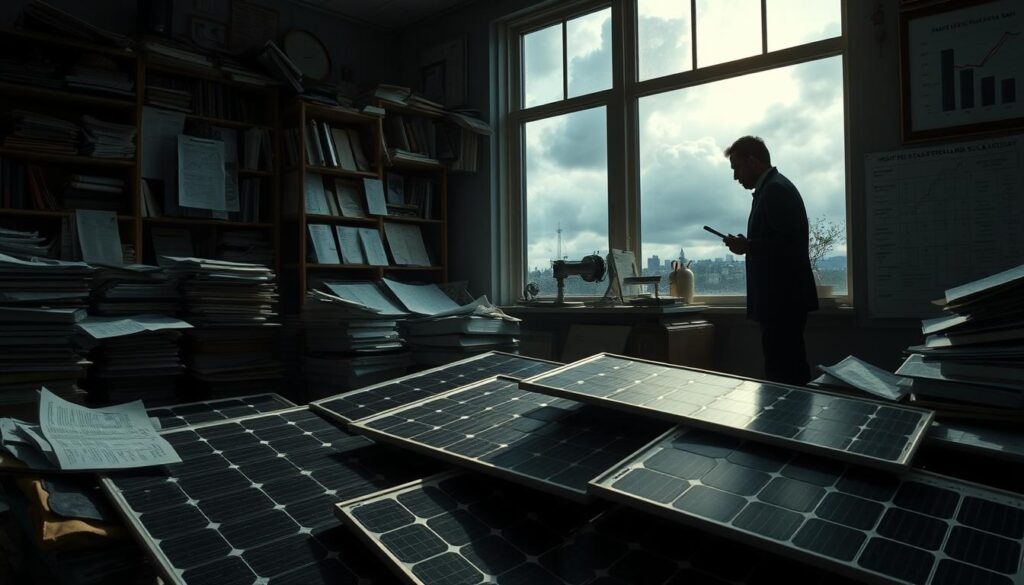
These investigations show how serious fraud is taken. They aim to fix current problems and stop future ones. Knowing how these investigations work helps people stay safe and make smart choices.
Common Complaints About Solar Panel Scams
The rise in solar energy popularity has led to more solar panel scams. Many people have shared their frustrations through solar scam complaints. They warn others to be careful before choosing a solar installation.
Case Studies of Common Issues
- Installation Problems: Some have found their installations to be poorly done. This can cause systems to malfunction or lead to electrical problems. Often, this is due to contractors who claim to be qualified but aren’t.
- Misrepresented Savings: Many have been promised big savings on their energy bills. But, after the installation, these savings don’t match what was promised. This can be very disappointing.
- Warranty Issues: Dealing with warranty claims can be tough. Sometimes, companies vanish after selling, leaving customers without help for faulty products.
- Pressure Tactics: Some feel pushed to sign contracts fast, without time to read the fine print. This can lead to buyer’s remorse once the true cost is understood.
These stories show common problems with solar panel scams. Being aware and doing your homework can help avoid these scams.
Solar Panel Scams and Environmental Impact
The growth of solar energy has many benefits, helping us move toward a greener future. But, solar scams are a big problem. They harm not just individuals but also the trust in clean energy for our communities.
Scams in solar energy can make people hesitant to invest in solar power. This is because of bad experiences others have had. It makes it harder for us to work towards a cleaner environment, as people doubt the real solar options.
Some common problems caused by solar scams include:
- Less people choosing solar energy technologies.
- Money lost that could have helped good projects.
- More rules for real solar businesses, making things harder for them.
The harm from solar scams slows down our progress toward renewable energy goals. It’s crucial for us to fight solar energy fraud. This way, we protect our money and our commitment to a sustainable future.
Conclusion
Staying alert and learning are crucial in fighting solar panel scams. The solar industry is good but can also attract scams. Knowing about scams like fake offers and tricky contracts helps you stay safe.
Use the tips from this article to protect your money. Look up trusted solar companies and know your rights. Being ready is your strongest defense.
By being careful and informed, you help the solar industry stay honest. Share what you learn to keep everyone safe. Together, we can make energy safe and green.
FAQ
What are common solar panel scams I should be aware of?
Solar panel scams include fake offers and misleading contracts. Salespeople might push you to decide fast without doing your homework. Knowing these tricks helps you stay safe from scams.
How can I avoid falling victim to solar panel scams?
To dodge scams, check if installers are licensed and ask for references. Look up online reviews and get several quotes. Being wary of unsolicited calls and doing your homework helps too.
What are the signs of a solar panel scam?
Scams often promise too much savings or use high-pressure sales. They might be unclear about costs or hide fees. Always read contracts slowly and ask questions if you’re unsure.
Where can I report suspected solar panel scams?
Report scams to the Federal Trade Commission (FTC) or your local consumer protection office. Your state’s attorney general’s office can also help. Keep detailed records of the scam to aid in the investigation.
Why is it important to choose reputable solar companies?
Picking trusted solar companies means better service and less chance of fraud. They offer clear prices and contracts, ensuring quality work.
How can I educate myself about solar technology to avoid scams?
Learn about solar panels and industry terms. Understand your rights with warranties and contracts. Knowing this helps you make smart choices.
What steps should I take if I have fallen victim to a solar panel scam?
If scammed, keep all documents and photos. Report it to the right places and think about legal advice. This can help you recover.
How can communities prevent solar panel scams?
Communities can fight scams by hosting workshops and sharing scam info. Forming groups to spot and report suspicious solar activities is also helpful.
